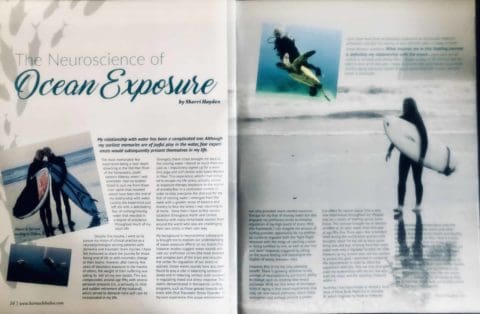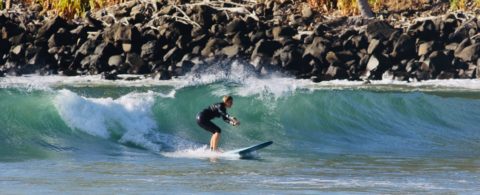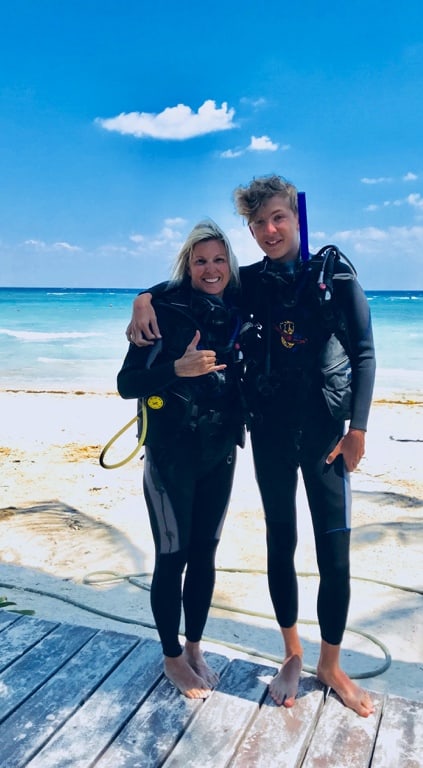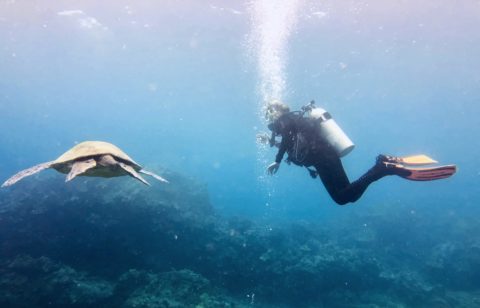
The Neuroscience of Ocean Exposure
My relationship with water has been a complicated one.
Strangely, these crises brought me back to the moving water …

My background in neuroscience subsequently brought me to explore our understanding of ocean exposure effects on our brains. For instance, studies suggest ocean sounds activate our prefrontal cortex (the most evolved and complex part of the brain and includes the centre for regulation of our stress response). Ocean wave sounds have also been found to play a role in balancing serotonin levels and in reducing cortisol, both involved in regulating mood and stress response. This seems demonstrated in therapeutic surfing programs, such as those geared towards veterans with Post Traumatic Stress Disorder. In my own experience, this ocean environment not only provided much-needed exposure therapy for my fear of moving water but also engaged my prefrontal cortex to enhance the regulation of my high levels of stress. With this framework, I can imagine the process of surfing provides the opportunity for my prefrontal cortex to regulate both the “fight-flight” response with the surge of catching a wave or being tumbled by one, as well as the “rest and store” response, triggered by sitting on the board feeling and listening to the rhythm of waves between rides.
However, this is not the only potential benefit …
There is growing attention to the concept of neuroplasticity, our brain’s ability to change, such as creating new neural pathways. What we now know of neuroplasticity in aging is that novel experiences may help set new neural pathways, which likely strengthen and perhaps provide a protective effect for neural tissue. This is why new experiences throughout our lifespan may be a means of ‘beefing up’ our brain tissue.

This concept brought me to become certified as an open water diver this year at age fifty-five.
Once again, fear presented itself during the certification process with thoughts about I’m too old to learn something new and fear of being forty feet underwater with only a regulator to keep me alive. However, as my sixteen-year-old son wanted to pursue this goal, I persisted to complete the requirements in order to share the experience with him.
This not only strengthened my relationship with my son, but also with the ocean and the amazing creatures within it.

Recently, I had the opportunity to attend a workshop on Mind-Body Medicine in Ucluelet, BC…
Recently, I had the opportunity to attend a workshop on Mind-Body Medicine in Ucluelet, BC, which inspired my hope to integrate an understanding of neuroscience with the healing powers of the ocean and other lifestyle factors for brain health and healthy aging. In reflection on this, I find it is interesting to consider that the three animals with the greatest potential life longevity are sea creatures, such as the Greenland shark, bowhead whale and Galapagos giant tortoise). As we seek greater understanding for healing of our body, brain and mental health, it seems we should turn our minds to the ocean. Certainly, in my own life, the ocean has been a revelation for its power to help me to manage stress, both personally and at work. For this, I am grateful.
 Dr. Hayden is a Clinical Neuropsychologist and Clinical Assistant Professor with the Division of Neurology, Department of Medicine, at the University of British Columbia. Since 1993, Dr. Hayden has worked at UBC Hospital (Clinic for Alzheimer’s Disease & Related Disorders) and is the Founder/Director of the NeuroHealth Clinic. (http://www.neurohealthclinic.ca). Dr. Hayden’s is now applying functional medicine principles to brain health and healthy aging issues.
Dr. Hayden is a Clinical Neuropsychologist and Clinical Assistant Professor with the Division of Neurology, Department of Medicine, at the University of British Columbia. Since 1993, Dr. Hayden has worked at UBC Hospital (Clinic for Alzheimer’s Disease & Related Disorders) and is the Founder/Director of the NeuroHealth Clinic. (http://www.neurohealthclinic.ca). Dr. Hayden’s is now applying functional medicine principles to brain health and healthy aging issues.


